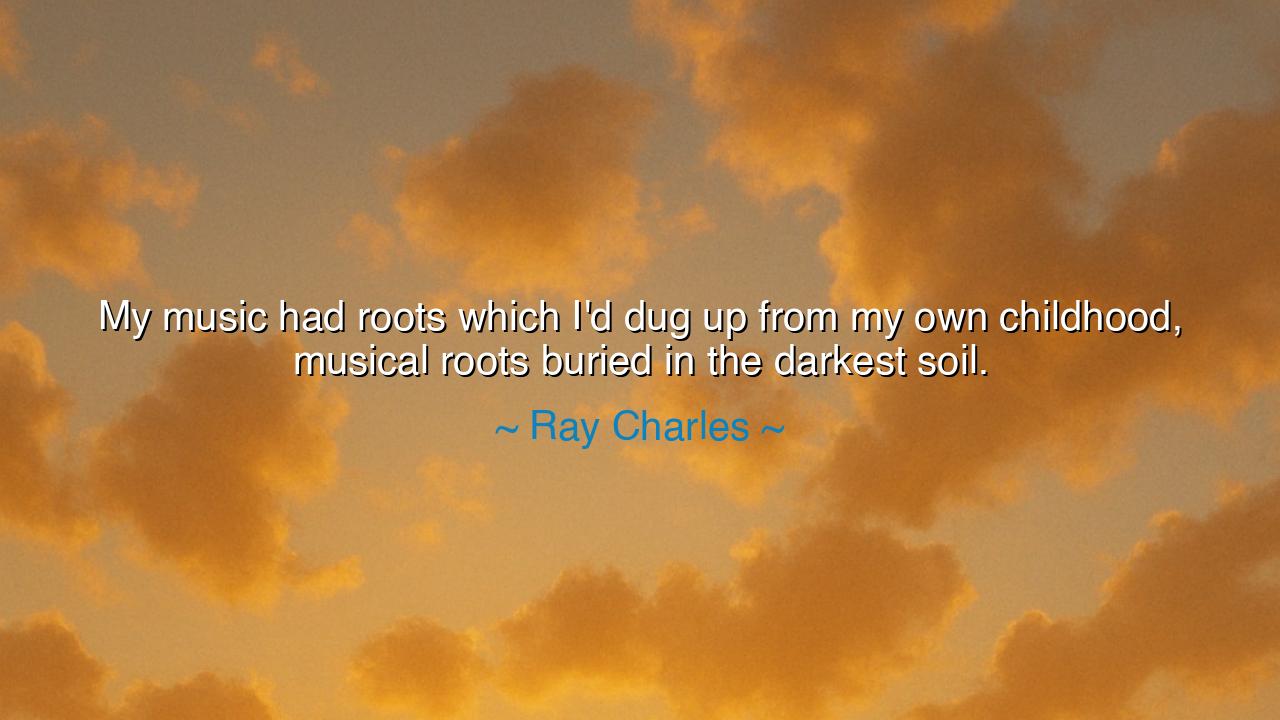
My music had roots which I'd dug up from my own childhood
My music had roots which I'd dug up from my own childhood, musical roots buried in the darkest soil.






When Ray Charles confessed, “My music had roots which I’d dug up from my own childhood, musical roots buried in the darkest soil,” he spoke as one who had traveled through sorrow and suffering, and yet returned with treasures for the world. In these words we see the eternal truth: that the deepest art, the most powerful music, does not spring from ease or luxury, but from the fertile earth of struggle, pain, and longing. The roots of his sound were not the polished inventions of wealth or privilege, but the rough, tangled roots of a boy who lost his sight, who tasted grief, and who wrestled with shadows. Out of this dark soil, he drew not despair, but beauty—an offering to generations.
The ancients often taught that greatness arises from trial. They told of the phoenix, which must burn in fire before it is reborn in glory. They told of seeds, which must be buried in the darkness of the earth before they can rise toward the sun. In this same way, Ray Charles’ music grew from the soil of hardship. Blindness did not silence him. Poverty did not chain him. Instead, they became the very soil from which his sound blossomed, rich and soulful, carrying the voice of one who had known sorrow yet chosen joy.
Consider the blues, that river of sound flowing from the history of a people oppressed, enslaved, and denied. Its notes are heavy, yet they rise like incense. They do not deny the darkness, but they transform it into something beautiful. Ray Charles, drawing from gospel, blues, and jazz, forged a sound that was uniquely his own—yet it was built upon the roots of struggle. Just as the Hebrew psalmists turned lament into song, he too turned hardship into melody, and his voice carried both pain and triumph.
His story reminds us of Beethoven, who though deaf, composed symphonies that echoed through the halls of eternity. Or of Frederick Douglass, who though born into slavery, learned to read, and through his words freed not only himself but the hearts of countless others. In each of these lives, we see the same pattern: the darkest soil is not a curse, but the ground where the strongest roots take hold. Those who endure it, and dare to dig deep into it, bring forth fruit that nourishes the world.
Ray Charles’ declaration is not only about music. It is about life itself. Each of us has roots—some buried in hardship, others tangled in grief, still others watered with tears. We are tempted to hide them, to bury them deeper. Yet it is when we dare to dig, to face the truth of our past, that we uncover the power to create. For it is authenticity, born of honesty and struggle, that gives strength to our voice. What is false fades, but what is rooted in the soil of truth endures.
The lesson is clear: do not despise your dark soil. Do not curse the hardships of your childhood or the burdens you carry. Instead, recognize them as the ground of strength, the foundation of your becoming. Dig deep into them, not with bitterness, but with courage. Let them feed your craft, your work, your voice. Out of what was once sorrow can come beauty. Out of what was once silence can come a song.
Therefore, the practical path is this: embrace your story. Write it, sing it, live it—without shame. If you carry wounds, let them be healed not by denial, but by transformation. Turn them into fuel for your art, your kindness, your perseverance. Share them, for in sharing, you give others the courage to face their own roots.
And so, as Ray Charles did, dig into your dark soil, and do not fear what you will find. For within it lie the roots of your greatness, waiting to rise. The deeper the roots, the stronger the tree. The darker the soil, the brighter the flower. This is the ancient rhythm: from suffering comes strength, from roots comes life, and from music born of truth comes eternity.






AAdministratorAdministrator
Welcome, honored guests. Please leave a comment, we will respond soon